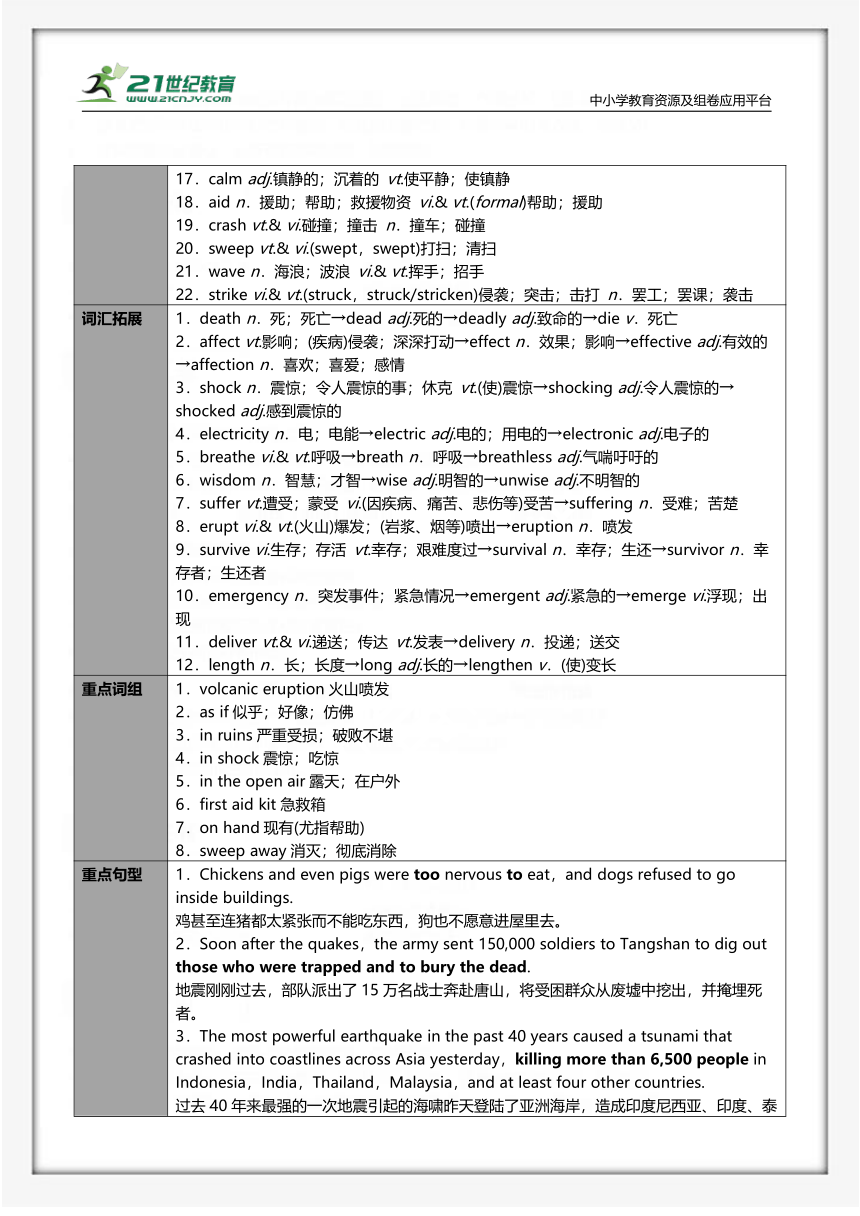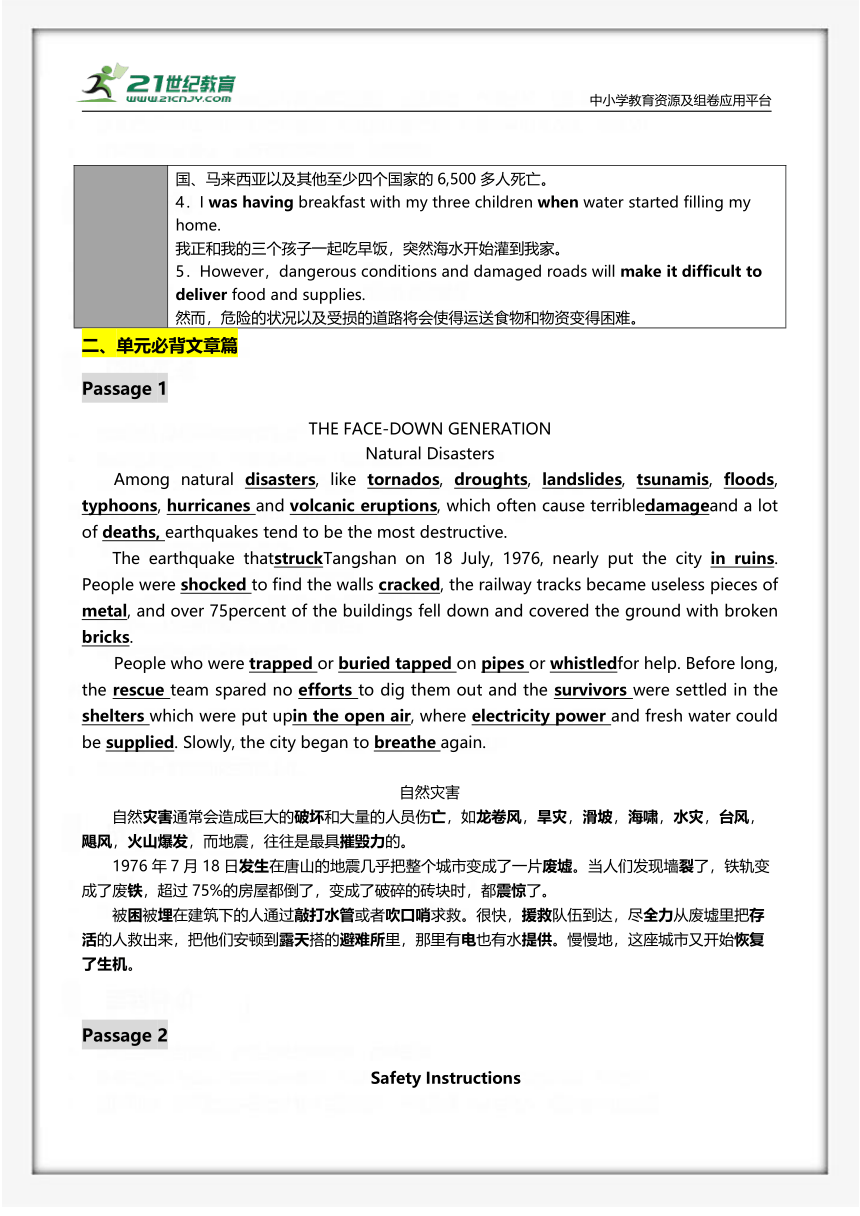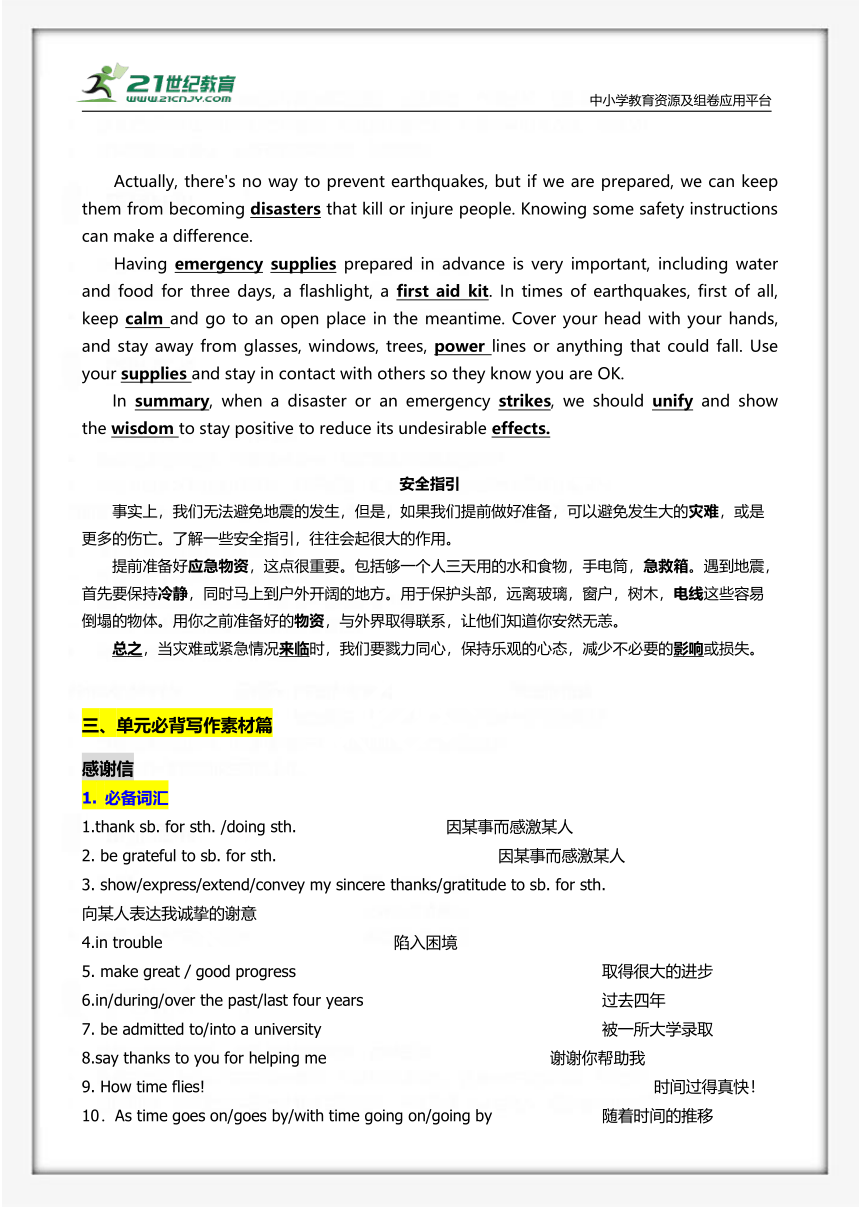(人教版2019)高考英语 一轮复习夯实基础必背知识清单 专题05.必修第1册 Unit 4 Natural Disasters
文档属性
| 名称 | (人教版2019)高考英语 一轮复习夯实基础必背知识清单 专题05.必修第1册 Unit 4 Natural Disasters |

|
|
| 格式 | docx | ||
| 文件大小 | 114.2KB | ||
| 资源类型 | 试卷 | ||
| 版本资源 | 人教版(2019) | ||
| 科目 | 英语 | ||
| 更新时间 | 2022-11-18 00:00:00 | ||
图片预览




文档简介
中小学教育资源及组卷应用平台
一轮复习夯实基础必背知识清单
专题05.必修第1册 Unit 4 Natural Disasters
一、单元必背词汇篇
重点词汇 阅读单词——我会认 1.tornado n.(pl.-oes or -os)龙卷风;旋风 2.drought n.旱灾;久旱 3.landslide n.(landfall)(山地或悬崖的)崩塌;滑坡 4.tsunami n.海啸 5.magnitude n.(地)震级;重大 6.evacuate vt.疏散;撤出 vi.撤离 7.helicopter n.直升机 8.crack n.裂纹;裂缝 vi.& vt.(使)破裂 9.brick n.砖;砖块 10.metal n.金属 11.revive vt.& vi.复活;(使)苏醒 12.revival n.振兴;复苏 13.unify vi.& vt.统一;(使)成一体 14.volcano n.(pl.-oes or -os)火山 15.typhoon n.台风 16.hurricane n.(尤指西大西洋的)飓风 17.whistle vi.吹口哨;发出笛声 vt.吹口哨 n.哨子(声);呼啸声 18.summary n.总结;概括;概要 重点单词——我会写 1.disaster n.灾难;灾害 2.slide vi.& vt.(使)滑行;滑动 3.flood n.洪水;大量 vi.淹没;大量涌入 vt.使灌满水;淹没 4.rescue n.& vt.营救;救援 5.damage vt.损害;破坏n.损坏;损失 6.destroy vt.摧毁;毁灭 7.shelter n.避难处;居所;庇护 vt.保护;掩蔽 vi.躲避(风雨或危险) 8.ruin n.& vt.破坏;毁坏 9.percent n.百分之…… adj.& adv.每一百中 10.trap vt.使落入险境;使陷入圈套 n.险境;陷阱 11.bury vt.埋葬;安葬 12.effort n.努力;艰难的尝试;尽力 13.context n.上下文;语境;背景 14.supply n.供应(量);补给;[pl.]补给品 vt.供应;供给 15.tap vi.& vt.轻叩;轻敲;轻拍 n.水龙头;轻叩;轻敲 16.pipe n.管子;管道 17.calm adj.镇静的;沉着的 vt.使平静;使镇静 18.aid n.援助;帮助;救援物资 vi.& vt.(formal)帮助;援助 19.crash vt.& vi.碰撞;撞击 n.撞车;碰撞 20.sweep vt.& vi.(swept,swept)打扫;清扫 21.wave n.海浪;波浪 vi.& vt.挥手;招手 22.strike vi.& vt.(struck,struck/stricken)侵袭;突击;击打 n.罢工;罢课;袭击
词汇拓展 1.death n.死;死亡→dead adj.死的→deadly adj.致命的→die v.死亡 2.affect vt.影响;(疾病)侵袭;深深打动→effect n.效果;影响→effective adj.有效的→affection n.喜欢;喜爱;感情 3.shock n.震惊;令人震惊的事;休克 vt.(使)震惊→shocking adj.令人震惊的→shocked adj.感到震惊的 4.electricity n.电;电能→electric adj.电的;用电的→electronic adj.电子的 5.breathe vi.& vt.呼吸→breath n.呼吸→breathless adj.气喘吁吁的 6.wisdom n.智慧;才智→wise adj.明智的→unwise adj.不明智的 7.suffer vt.遭受;蒙受 vi.(因疾病、痛苦、悲伤等)受苦→suffering n.受难;苦楚 8.erupt vi.& vt.(火山)爆发;(岩浆、烟等)喷出→eruption n.喷发 9.survive vi.生存;存活 vt.幸存;艰难度过→survival n.幸存;生还→survivor n.幸存者;生还者 10.emergency n.突发事件;紧急情况→emergent adj.紧急的→emerge vi.浮现;出现 11.deliver vt.& vi.递送;传达 vt.发表→delivery n.投递;送交 12.length n.长;长度→long adj.长的→lengthen v.(使)变长
重点词组 1.volcanic eruption火山喷发 2.as if似乎;好像;仿佛 3.in ruins严重受损;破败不堪 4.in shock震惊;吃惊 5.in the open air露天;在户外 6.first aid kit急救箱 7.on hand现有(尤指帮助) 8.sweep away消灭;彻底消除
重点句型 1.Chickens and even pigs were too nervous to eat,and dogs refused to go inside buildings. 鸡甚至连猪都太紧张而不能吃东西,狗也不愿意进屋里去。 2.Soon after the quakes,the army sent 150,000 soldiers to Tangshan to dig out those who were trapped and to bury the dead. 地震刚刚过去,部队派出了15万名战士奔赴唐山,将受困群众从废墟中挖出,并掩埋死者。 3.The most powerful earthquake in the past 40 years caused a tsunami that crashed into coastlines across Asia yesterday,killing more than 6,500 people in Indonesia,India,Thailand,Malaysia,and at least four other countries. 过去40年来最强的一次地震引起的海啸昨天登陆了亚洲海岸,造成印度尼西亚、印度、泰国、马来西亚以及其他至少四个国家的6,500多人死亡。 4.I was having breakfast with my three children when water started filling my home. 我正和我的三个孩子一起吃早饭,突然海水开始灌到我家。 5.However,dangerous conditions and damaged roads will make it difficult to deliver food and supplies. 然而,危险的状况以及受损的道路将会使得运送食物和物资变得困难。
单元必背文章篇
Passage 1
THE FACE-DOWN GENERATION
Natural Disasters
Among natural disasters, like tornados, droughts, landslides, tsunamis, floods, typhoons, hurricanes and volcanic eruptions, which often cause terribledamageand a lot of deaths, earthquakes tend to be the most destructive.
The earthquake thatstruckTangshan on 18 July, 1976, nearly put the city in ruins. People were shocked to find the walls cracked, the railway tracks became useless pieces of metal, and over 75percent of the buildings fell down and covered the ground with broken bricks.
People who were trapped or buried tapped on pipes or whistledfor help. Before long, the rescue team spared no efforts to dig them out and the survivors were settled in the shelters which were put upin the open air, where electricity power and fresh water could be supplied. Slowly, the city began to breathe again.
自然灾害
自然灾害通常会造成巨大的破坏和大量的人员伤亡,如龙卷风,旱灾,滑坡,海啸,水灾,台风,飓风,火山爆发,而地震,往往是最具摧毁力的。
1976年7月18日发生在唐山的地震几乎把整个城市变成了一片废墟。当人们发现墙裂了,铁轨变成了废铁,超过75%的房屋都倒了,变成了破碎的砖块时,都震惊了。
被困被埋在建筑下的人通过敲打水管或者吹口哨求救。很快,援救队伍到达,尽全力从废墟里把存活的人救出来,把他们安顿到露天搭的避难所里,那里有电也有水提供。慢慢地,这座城市又开始恢复了生机。
Passage 2
Safety Instructions
Actually, there's no way to prevent earthquakes, but if we are prepared, we can keep them from becoming disasters that kill or injure people. Knowing some safety instructions can make a difference.
Having emergency supplies prepared in advance is very important, including water and food for three days, a flashlight, a first aid kit. In times of earthquakes, first of all, keep calm and go to an open place in the meantime. Cover your head with your hands, and stay away from glasses, windows, trees, power lines or anything that could fall. Use your supplies and stay in contact with others so they know you are OK.
In summary, when a disaster or an emergency strikes, we should unify and show the wisdom to stay positive to reduce its undesirable effects.
安全指引
事实上,我们无法避免地震的发生,但是,如果我们提前做好准备,可以避免发生大的灾难,或是更多的伤亡。了解一些安全指引,往往会起很大的作用。
提前准备好应急物资,这点很重要。包括够一个人三天用的水和食物,手电筒,急救箱。遇到地震,首先要保持冷静,同时马上到户外开阔的地方。用于保护头部,远离玻璃,窗户,树木,电线这些容易倒塌的物体。用你之前准备好的物资,与外界取得联系,让他们知道你安然无恙。
总之,当灾难或紧急情况来临时,我们要戮力同心,保持乐观的心态,减少不必要的影响或损失。
三、单元必背写作素材篇
感谢信
必备词汇
1.thank sb. for sth. /doing sth. 因某事而感激某人
2. be grateful to sb. for sth. 因某事而感激某人
3. show/express/extend/convey my sincere thanks/gratitude to sb. for sth.
向某人表达我诚挚的谢意
4.in trouble 陷入困境
5. make great/good progress 取得很大的进步
6.in/during/over the past/last four years 过去四年
7. be admitted to/into a university 被一所大学录取
8.say thanks to you for helping me 谢谢你帮助我
9. How time flies! 时间过得真快!
10.As time goes on/goes by/with time going on/going by 随着时间的推移
11. thanks to/owing to/because of your help 多亏了你的帮助
12.enjoy myself 玩得高兴
13.pay a visit to. 去参观,拜访
14. have a better understanding of… 对……有更好的理解
15.a place of interest 名胜
高分句式
首段:表达真挚谢意
1. Thank you so much for your generous help.
非常感谢您慷慨的帮助。
2.1 am sincerely grateful to you for your timely help.
我真诚地感谢你及时的帮助。
3.1t was so kind of you to treat me as your own sister.
谢谢你把我当作自己的妹妹。
4.1 am so grateful to you for what you have done for me.
我很感谢你为我所做的一切。
5.1 would like to convey my thanks to you for your kind help.
我想感谢你的帮助。
6. I’m writing to thank you for the few wonderful days in London.
我写信感谢你帮我在伦敦度过的快乐日子。
7.1 am writing to express/show/convey my sincere thanks to you for your help.
我写信真诚地感谢你的帮助。
8. For this reason, I am writing this letter to express my sincere thanks to you.
为此,我写这封信是为了表达我对你真诚的感谢。
中间段:解释感谢的原因或对方的帮助给自己带来的好处
1.Thanks to your help, I have made rapid progress in my English.
多亏了你的帮助,我的英语有了飞速的进步。
2. Without/But for your help(lf it were not for your help) ,I would not have made so much progress in my English.
要是没有你的帮助,我的英语不会取得如此大的进步。
3.1 extend you again a thousand thanks for the great favor.
我太感谢你的帮助了。
结尾段:再次感谢
1.Thanks again for helping me.
再次感谢你对我的帮助。
2.Thank you again for your generous help.
再次感谢你的慷慨帮助。
3. 1 would appreciate it if you could accept my sincere thanks.
如果你能接受我诚挚的感谢,我将不胜感激。
4. Your kindness and help will always be remembered.
我将永远铭记你的善意和帮助。
5.1 deeply/greatly appreciate your hospitality(款待).
我深深感谢你们的盛情款待。
四、单元必背语法篇
Grammar 关系代词引导的定语从句
(1)who指人,在从句中作主语或宾语,作宾语时可省略。
The man who is talking with my father is a teacher.正和我父亲说话的那个人是教师。(作主语)
The girl (who) I met yesterday was his sister.我昨天见到的那个女孩是他的妹妹。(作宾语)
(2)whom指人,在从句中作宾语,常可省略,不能作主语。
The man (whom) you met just now is my father.你刚刚遇到的人是我父亲。(作宾语)
The teacher (whom) you are waiting for is coming.你等的那位老师来了。(作宾语)
(3)whose既可指人,也可指物。其后接名词,与先行词构成从属关系,在从句中作定语。
This is the scientist whose name is known all over the country.这就是那位闻名全国的科学家。(作定语)
Nobody wants the house whose roof has fallen in.没有人想要这个屋顶已坍塌的房子。(作定语)
(4)which只指物,不指人,可作主语或宾语,作宾语时可省略。
Guilin is a city which has a history of 2,000 years.桂林是一个有2 000年历史的城市。(作主语)
The young man was very happy to get back the gold ring(which) he had lost on the train. (作宾语)
那个年轻人找回了在火车上丢失的金戒指,非常高兴。
(5)that既可指人,也可指物,在从句中作主语、宾语,作宾语时可以省略。
There is a film (that) I’d like to see.有一部电影我想去看。(作宾语)
She is the only one among us that knows French.她是我们当中唯一懂法语的人。(作主语)
只用that不用which的情况
(1)当先行词是all,everything,nothing,much,any,little等不定代词,或被no,little,all等修饰时。
He did everything that he could for me.他为我做了他所能做的所有的事。
No news that he tells us is good.他告诉我们的消息没有一个是好的。
(2)当先行词被最高级、序数词以及the very,the only修饰时。
This is the best film that I have seen.这是我所看过的最好的电影。
The only thing that matters is the baby’s health.唯一重要的是这个婴儿的健康。
This is the very book that I’ve been looking for.这正是我一直在找的那本书。
(3)当先行词既含有表示人的名词又含有表示物的名词时。
They talked about the men and the things that they saw in the country.
他们谈到了在那个国家见到的人和事。
(4)当主句是以which或who开头的特殊疑问句时。
Which is the hotel that he stayed at last night 他昨晚住的是哪家旅馆
温馨提示:
①关系代词在从句中作主语时,根据先行词的单复数决定从句谓语动词的单复数。
He is the only one of the students that has passed the exam.(the only one为先行词)
他是唯一通过考试的学生。
He is one of the students who have passed the exam .(the students为先行词)
他是通过考试的学生之一。
②关系代词的省略:在限制性定语从句中,关系代词作动词宾语或介词宾语 时(这时介词不能在关系代词前)常可省略。
The boy (that/who/whom)we saw last night was Li Ming.我们昨天晚上见到的那个男孩是李明。
③定语从句中常见错误:
缺先行词:Is this school that you visited last year (该句缺先行词,应在“school”后面加上“the one”)
缺关系词:Children eat a lot of sugar often have bad teeth.(应在“Children”后面加上“who”,关系代词作主语时不能省略)
成分重复:This is the house where I lived there years ago.(“where”和“there”句子成分重复,应去掉“there”)
一轮复习夯实基础必背知识清单
专题05.必修第1册 Unit 4 Natural Disasters
一、单元必背词汇篇
重点词汇 阅读单词——我会认 1.tornado n.(pl.-oes or -os)龙卷风;旋风 2.drought n.旱灾;久旱 3.landslide n.(landfall)(山地或悬崖的)崩塌;滑坡 4.tsunami n.海啸 5.magnitude n.(地)震级;重大 6.evacuate vt.疏散;撤出 vi.撤离 7.helicopter n.直升机 8.crack n.裂纹;裂缝 vi.& vt.(使)破裂 9.brick n.砖;砖块 10.metal n.金属 11.revive vt.& vi.复活;(使)苏醒 12.revival n.振兴;复苏 13.unify vi.& vt.统一;(使)成一体 14.volcano n.(pl.-oes or -os)火山 15.typhoon n.台风 16.hurricane n.(尤指西大西洋的)飓风 17.whistle vi.吹口哨;发出笛声 vt.吹口哨 n.哨子(声);呼啸声 18.summary n.总结;概括;概要 重点单词——我会写 1.disaster n.灾难;灾害 2.slide vi.& vt.(使)滑行;滑动 3.flood n.洪水;大量 vi.淹没;大量涌入 vt.使灌满水;淹没 4.rescue n.& vt.营救;救援 5.damage vt.损害;破坏n.损坏;损失 6.destroy vt.摧毁;毁灭 7.shelter n.避难处;居所;庇护 vt.保护;掩蔽 vi.躲避(风雨或危险) 8.ruin n.& vt.破坏;毁坏 9.percent n.百分之…… adj.& adv.每一百中 10.trap vt.使落入险境;使陷入圈套 n.险境;陷阱 11.bury vt.埋葬;安葬 12.effort n.努力;艰难的尝试;尽力 13.context n.上下文;语境;背景 14.supply n.供应(量);补给;[pl.]补给品 vt.供应;供给 15.tap vi.& vt.轻叩;轻敲;轻拍 n.水龙头;轻叩;轻敲 16.pipe n.管子;管道 17.calm adj.镇静的;沉着的 vt.使平静;使镇静 18.aid n.援助;帮助;救援物资 vi.& vt.(formal)帮助;援助 19.crash vt.& vi.碰撞;撞击 n.撞车;碰撞 20.sweep vt.& vi.(swept,swept)打扫;清扫 21.wave n.海浪;波浪 vi.& vt.挥手;招手 22.strike vi.& vt.(struck,struck/stricken)侵袭;突击;击打 n.罢工;罢课;袭击
词汇拓展 1.death n.死;死亡→dead adj.死的→deadly adj.致命的→die v.死亡 2.affect vt.影响;(疾病)侵袭;深深打动→effect n.效果;影响→effective adj.有效的→affection n.喜欢;喜爱;感情 3.shock n.震惊;令人震惊的事;休克 vt.(使)震惊→shocking adj.令人震惊的→shocked adj.感到震惊的 4.electricity n.电;电能→electric adj.电的;用电的→electronic adj.电子的 5.breathe vi.& vt.呼吸→breath n.呼吸→breathless adj.气喘吁吁的 6.wisdom n.智慧;才智→wise adj.明智的→unwise adj.不明智的 7.suffer vt.遭受;蒙受 vi.(因疾病、痛苦、悲伤等)受苦→suffering n.受难;苦楚 8.erupt vi.& vt.(火山)爆发;(岩浆、烟等)喷出→eruption n.喷发 9.survive vi.生存;存活 vt.幸存;艰难度过→survival n.幸存;生还→survivor n.幸存者;生还者 10.emergency n.突发事件;紧急情况→emergent adj.紧急的→emerge vi.浮现;出现 11.deliver vt.& vi.递送;传达 vt.发表→delivery n.投递;送交 12.length n.长;长度→long adj.长的→lengthen v.(使)变长
重点词组 1.volcanic eruption火山喷发 2.as if似乎;好像;仿佛 3.in ruins严重受损;破败不堪 4.in shock震惊;吃惊 5.in the open air露天;在户外 6.first aid kit急救箱 7.on hand现有(尤指帮助) 8.sweep away消灭;彻底消除
重点句型 1.Chickens and even pigs were too nervous to eat,and dogs refused to go inside buildings. 鸡甚至连猪都太紧张而不能吃东西,狗也不愿意进屋里去。 2.Soon after the quakes,the army sent 150,000 soldiers to Tangshan to dig out those who were trapped and to bury the dead. 地震刚刚过去,部队派出了15万名战士奔赴唐山,将受困群众从废墟中挖出,并掩埋死者。 3.The most powerful earthquake in the past 40 years caused a tsunami that crashed into coastlines across Asia yesterday,killing more than 6,500 people in Indonesia,India,Thailand,Malaysia,and at least four other countries. 过去40年来最强的一次地震引起的海啸昨天登陆了亚洲海岸,造成印度尼西亚、印度、泰国、马来西亚以及其他至少四个国家的6,500多人死亡。 4.I was having breakfast with my three children when water started filling my home. 我正和我的三个孩子一起吃早饭,突然海水开始灌到我家。 5.However,dangerous conditions and damaged roads will make it difficult to deliver food and supplies. 然而,危险的状况以及受损的道路将会使得运送食物和物资变得困难。
单元必背文章篇
Passage 1
THE FACE-DOWN GENERATION
Natural Disasters
Among natural disasters, like tornados, droughts, landslides, tsunamis, floods, typhoons, hurricanes and volcanic eruptions, which often cause terribledamageand a lot of deaths, earthquakes tend to be the most destructive.
The earthquake thatstruckTangshan on 18 July, 1976, nearly put the city in ruins. People were shocked to find the walls cracked, the railway tracks became useless pieces of metal, and over 75percent of the buildings fell down and covered the ground with broken bricks.
People who were trapped or buried tapped on pipes or whistledfor help. Before long, the rescue team spared no efforts to dig them out and the survivors were settled in the shelters which were put upin the open air, where electricity power and fresh water could be supplied. Slowly, the city began to breathe again.
自然灾害
自然灾害通常会造成巨大的破坏和大量的人员伤亡,如龙卷风,旱灾,滑坡,海啸,水灾,台风,飓风,火山爆发,而地震,往往是最具摧毁力的。
1976年7月18日发生在唐山的地震几乎把整个城市变成了一片废墟。当人们发现墙裂了,铁轨变成了废铁,超过75%的房屋都倒了,变成了破碎的砖块时,都震惊了。
被困被埋在建筑下的人通过敲打水管或者吹口哨求救。很快,援救队伍到达,尽全力从废墟里把存活的人救出来,把他们安顿到露天搭的避难所里,那里有电也有水提供。慢慢地,这座城市又开始恢复了生机。
Passage 2
Safety Instructions
Actually, there's no way to prevent earthquakes, but if we are prepared, we can keep them from becoming disasters that kill or injure people. Knowing some safety instructions can make a difference.
Having emergency supplies prepared in advance is very important, including water and food for three days, a flashlight, a first aid kit. In times of earthquakes, first of all, keep calm and go to an open place in the meantime. Cover your head with your hands, and stay away from glasses, windows, trees, power lines or anything that could fall. Use your supplies and stay in contact with others so they know you are OK.
In summary, when a disaster or an emergency strikes, we should unify and show the wisdom to stay positive to reduce its undesirable effects.
安全指引
事实上,我们无法避免地震的发生,但是,如果我们提前做好准备,可以避免发生大的灾难,或是更多的伤亡。了解一些安全指引,往往会起很大的作用。
提前准备好应急物资,这点很重要。包括够一个人三天用的水和食物,手电筒,急救箱。遇到地震,首先要保持冷静,同时马上到户外开阔的地方。用于保护头部,远离玻璃,窗户,树木,电线这些容易倒塌的物体。用你之前准备好的物资,与外界取得联系,让他们知道你安然无恙。
总之,当灾难或紧急情况来临时,我们要戮力同心,保持乐观的心态,减少不必要的影响或损失。
三、单元必背写作素材篇
感谢信
必备词汇
1.thank sb. for sth. /doing sth. 因某事而感激某人
2. be grateful to sb. for sth. 因某事而感激某人
3. show/express/extend/convey my sincere thanks/gratitude to sb. for sth.
向某人表达我诚挚的谢意
4.in trouble 陷入困境
5. make great/good progress 取得很大的进步
6.in/during/over the past/last four years 过去四年
7. be admitted to/into a university 被一所大学录取
8.say thanks to you for helping me 谢谢你帮助我
9. How time flies! 时间过得真快!
10.As time goes on/goes by/with time going on/going by 随着时间的推移
11. thanks to/owing to/because of your help 多亏了你的帮助
12.enjoy myself 玩得高兴
13.pay a visit to. 去参观,拜访
14. have a better understanding of… 对……有更好的理解
15.a place of interest 名胜
高分句式
首段:表达真挚谢意
1. Thank you so much for your generous help.
非常感谢您慷慨的帮助。
2.1 am sincerely grateful to you for your timely help.
我真诚地感谢你及时的帮助。
3.1t was so kind of you to treat me as your own sister.
谢谢你把我当作自己的妹妹。
4.1 am so grateful to you for what you have done for me.
我很感谢你为我所做的一切。
5.1 would like to convey my thanks to you for your kind help.
我想感谢你的帮助。
6. I’m writing to thank you for the few wonderful days in London.
我写信感谢你帮我在伦敦度过的快乐日子。
7.1 am writing to express/show/convey my sincere thanks to you for your help.
我写信真诚地感谢你的帮助。
8. For this reason, I am writing this letter to express my sincere thanks to you.
为此,我写这封信是为了表达我对你真诚的感谢。
中间段:解释感谢的原因或对方的帮助给自己带来的好处
1.Thanks to your help, I have made rapid progress in my English.
多亏了你的帮助,我的英语有了飞速的进步。
2. Without/But for your help(lf it were not for your help) ,I would not have made so much progress in my English.
要是没有你的帮助,我的英语不会取得如此大的进步。
3.1 extend you again a thousand thanks for the great favor.
我太感谢你的帮助了。
结尾段:再次感谢
1.Thanks again for helping me.
再次感谢你对我的帮助。
2.Thank you again for your generous help.
再次感谢你的慷慨帮助。
3. 1 would appreciate it if you could accept my sincere thanks.
如果你能接受我诚挚的感谢,我将不胜感激。
4. Your kindness and help will always be remembered.
我将永远铭记你的善意和帮助。
5.1 deeply/greatly appreciate your hospitality(款待).
我深深感谢你们的盛情款待。
四、单元必背语法篇
Grammar 关系代词引导的定语从句
(1)who指人,在从句中作主语或宾语,作宾语时可省略。
The man who is talking with my father is a teacher.正和我父亲说话的那个人是教师。(作主语)
The girl (who) I met yesterday was his sister.我昨天见到的那个女孩是他的妹妹。(作宾语)
(2)whom指人,在从句中作宾语,常可省略,不能作主语。
The man (whom) you met just now is my father.你刚刚遇到的人是我父亲。(作宾语)
The teacher (whom) you are waiting for is coming.你等的那位老师来了。(作宾语)
(3)whose既可指人,也可指物。其后接名词,与先行词构成从属关系,在从句中作定语。
This is the scientist whose name is known all over the country.这就是那位闻名全国的科学家。(作定语)
Nobody wants the house whose roof has fallen in.没有人想要这个屋顶已坍塌的房子。(作定语)
(4)which只指物,不指人,可作主语或宾语,作宾语时可省略。
Guilin is a city which has a history of 2,000 years.桂林是一个有2 000年历史的城市。(作主语)
The young man was very happy to get back the gold ring(which) he had lost on the train. (作宾语)
那个年轻人找回了在火车上丢失的金戒指,非常高兴。
(5)that既可指人,也可指物,在从句中作主语、宾语,作宾语时可以省略。
There is a film (that) I’d like to see.有一部电影我想去看。(作宾语)
She is the only one among us that knows French.她是我们当中唯一懂法语的人。(作主语)
只用that不用which的情况
(1)当先行词是all,everything,nothing,much,any,little等不定代词,或被no,little,all等修饰时。
He did everything that he could for me.他为我做了他所能做的所有的事。
No news that he tells us is good.他告诉我们的消息没有一个是好的。
(2)当先行词被最高级、序数词以及the very,the only修饰时。
This is the best film that I have seen.这是我所看过的最好的电影。
The only thing that matters is the baby’s health.唯一重要的是这个婴儿的健康。
This is the very book that I’ve been looking for.这正是我一直在找的那本书。
(3)当先行词既含有表示人的名词又含有表示物的名词时。
They talked about the men and the things that they saw in the country.
他们谈到了在那个国家见到的人和事。
(4)当主句是以which或who开头的特殊疑问句时。
Which is the hotel that he stayed at last night 他昨晚住的是哪家旅馆
温馨提示:
①关系代词在从句中作主语时,根据先行词的单复数决定从句谓语动词的单复数。
He is the only one of the students that has passed the exam.(the only one为先行词)
他是唯一通过考试的学生。
He is one of the students who have passed the exam .(the students为先行词)
他是通过考试的学生之一。
②关系代词的省略:在限制性定语从句中,关系代词作动词宾语或介词宾语 时(这时介词不能在关系代词前)常可省略。
The boy (that/who/whom)we saw last night was Li Ming.我们昨天晚上见到的那个男孩是李明。
③定语从句中常见错误:
缺先行词:Is this school that you visited last year (该句缺先行词,应在“school”后面加上“the one”)
缺关系词:Children eat a lot of sugar often have bad teeth.(应在“Children”后面加上“who”,关系代词作主语时不能省略)
成分重复:This is the house where I lived there years ago.(“where”和“there”句子成分重复,应去掉“there”)
